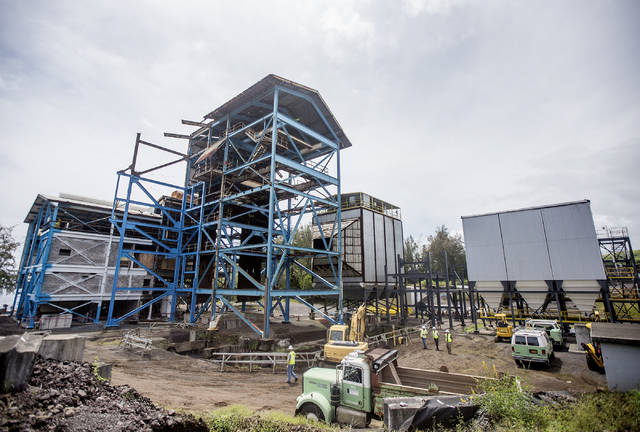A Hilo bed-and-breakfast owner is suing the county’s Planning Department and Windward Planning Commission, seeking an environmental review of the Hu Honua biomass power plant under construction in Pepeekeo.
The civil suit, filed by Claudia Rohr on Nov. 27 in Hilo Circuit Court, also requests construction of the 30-megawatt power plant be halted until an environmental impact statement or environmental assessment has been completed.
Hu Honua Bioenergy and its parent company, Island BioEnergy, are not named as defendants.
In the suit, Rohr alleges the project’s primary discharge structure for industrial storm water into the ocean is in a “current condition of disrepair … does not fulfill its intended purpose of settling out sediment from storm water, and it obviously needs alterations, repairs” and the location of the structure “is entirely within the shoreline area,” which necessitates an EIS or EA under the Hawaii Environmental Policy Act.
“I’ve been asking the planning commission and the Planning Department to have Hu Honua do an EA since 2010. … I use the area for recreation — hiking, fishing, Sunday drives,” Rohr said Tuesday. “I’m not trying to say they can’t do their project. … I just said they have to disclose what they’re doing and they have to get their proper approvals. … I’m trying to narrow it to one thing: Environmental review has been triggered.”
Deputy Planning Director Daryn Arai said the county has been served with the lawsuit.
Arai said Hu Honua, which is modifying the former Hilo Coast Processing Co. power plant, is operating under a Special Management Area use permit originally issued in 1985 to HCPC and modified in 2011. He said the county has “relied on the representations” of project engineers that the scope and location of the work performed under the permit doesn’t meet any of the triggers requiring an environmental review, so neither an EIS nor EA have been done.
The suit claims a June 30 field inspection by the state Department of Health’s Clean Water Branch found the discharge structure “is dysfunctional, in disrepair, and not draining correctly to settle out sediment … and that there is sediment in the concrete flume which would be discharged during the next storm event.”
DOH spokeswoman Anna Koethe confirmed in an email Thursday the Clean Water Branch conducted a routine compliance inspection at Hu Honua on June 30.
“However, at no time did we make conclusions of dysfunction, although we do have concerns about the facility’s aging discharge structures,” Koethe wrote. “It should also be noted that neither the facility nor construction activities were underway at the time of the inspection.
“… As is common during inspections, there were findings of non-compliance. … DOH’s Clean Water Branch did issue a field citation, which are commonly used to address non-major types of non-compliance. Findings made during the inspection included using out-of-date pollution control plans that needed to be updated, and having a sediment basin that required maintenance. Since the issuance of the field citation, representatives of Hu Honua have worked to address the findings detailed in the inspection report.”
The suit also claims if the power plant is completed and burns locally grown timber to generate electricity, as planned, logging trucks will negatively impact Rohr’s bed-and-breakfast, which is in Hilo’s Keaukaha neighborhood, and East Hawaii tourism in general.
“I feel the logging truck traffic … coming up from Pahala, going through downtown, going up to Pepeekeo, and also coming down the Hamakua Coast … is incompatible with my business,” she said. “I feel as though visitors are going to avoid coming to Hilo. It’s a 30-year project.”
The project has seen numerous setbacks and delays, including lawsuits, liens and layoffs. Hu Honua sued Hawaii Electric Light Co. after the Big Island utility cancelled a power purchase agreement in 2016 because of Hu Honua’s failure to meet certain deadlines. The suit was settled in May and HELCO and Hu Honua reached an amended and restated power purchase agreement that was approved by the state Public Utilities Commission in July.
In late August, the environmental advocacy group Life of the Land filed an appeal to the Hawaii Supreme Court seeking reversal of the PUC’s approval of the power purchase agreement, asserting the regulatory panel didn’t consider the emission of greenhouse gasses when it green-lighted the project.
“It is critical that state regulatory agencies consider climate change,” Henry Curtis, executive director of Life of the Land said in a statement at the time. “And the PUC is specifically required by law to do so.”
Rohr noted “significant changes” in the project over the years, including an increase from the originally proposed 21.5-megawatt plant to the current 30 megawatts and added, “There’s a lot of ifs.”
“I’m calling on the planning commission and the planning department to make a decision,” she said. “… Until they answer my amended complaint, we don’t know where they stand. … Hu Honua has to provide enough information for the public to understand what they’re doing.
“We have the right to ask questions and get answers. And they’ve been avoiding it.”
Island BioEnergy President Harold Robinson didn’t return a call seeking comment by press time.
Email John Burnett at jburnett@hawaiitribune-herald.com.






